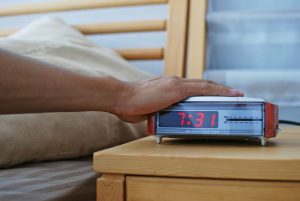With the recent daylight savings time changes, it can be distressing to hear that you are going to lose an hour of sleep. Especially if you are already feeling like you do not get enough sleep every night. According to the National Sleep Foundation, the average adult should get between 7 and 9 hours sleep a night for optimal health. Most American adults get about 7.5 hours a night according to the most recent Sleep Index Survey. 
With the addition of daylight savings time, losing an hour of sleep may put many in the unhealthy range for sleep hours per night. This can have a major impact on well-being since sleep affects many parts of our body. According to the National Institutes of Health, sleep can affect such things as:
- memory
- ability to learn
- mood
- healing and repair of heart and blood vessels
- hormone balance
- immune system response
Therefore, without adequate sleep, a person can be at higher risk for anxiety and depression, high blood pressure, and increased blood glucose levels.
Manage your sleep, manage your health
The National Sleep Foundation recommends that in order to ensure proper sleep each night, to stick to a sleeping schedule. Without a scheduled bed time each night, you may be at risk for staying up late. In addition, without a set bed time, you may end up engaging in mindless activities such as playing on the computer or watching television, which could affect your ability to wind down and have restful sleep.
Furthermore, limiting alcohol and caffeine intake can help improve sleep quality. Therefore, try to limit consuming caffeine-containing foods and drinks such as coffee, tea, and chocolate in the later half of your day to prevent over-stimulation. On a similar note, limit alcohol consumption to improve sleep quality and quantity. Although, you may fall asleep faster after a glass of wine, alcohol actually reduces rapid eye movement (also known as REM). REM sleep is a deep state of sleep, so without it, you may feel tired upon waking. Therefore, after drinking alcohol, you may fall asleep fast and then wake up earlier and unrested.
Natural supplements such as melatonin, such as that found in Vita Science’s Somnova may also help sleep. Somnova contains a powerful blend of melatonin, L-Theanine, and magnesium, which work together to promote healthy sleep. Melatonin is a hormone that helps to maintain a health Circadian rhythm in the body. Visit Vita Sciences website to check out some other supplements that can help you live a healthier, fuller life.
Also, be sure to visit the National Sleep Foundation website for more tips, research, and ![]() information about how you can improve your sleep.
information about how you can improve your sleep.
-written by Staci Gulbin, MS, MEd, RD, LDN
Sources:
National Heart, Lung, and Blood Institute (Feb 22, 2012). “Why Is Sleep Important?” https://www.nhlbi.nih.gov/health/health-topics/topics/sdd/why
National Sleep Foundation (accessed 2017 March 20). “How Much Sleep Do We Really Need?” https://sleepfoundation.org/how-sleep-works/how-much-sleep-do-we-really-need
National Sleep Foundation (accessed 2017 March 20). ” How Alcohol Affects the Quality- and Quantity- of Sleep” https://sleepfoundation.org/sleep-topics/how-alcohol-affects-sleep
University of Maryland Medical Center (Feb 3, 2016). “Melatonin” http://umm.edu/health/medical/altmed/supplement/melatonin.